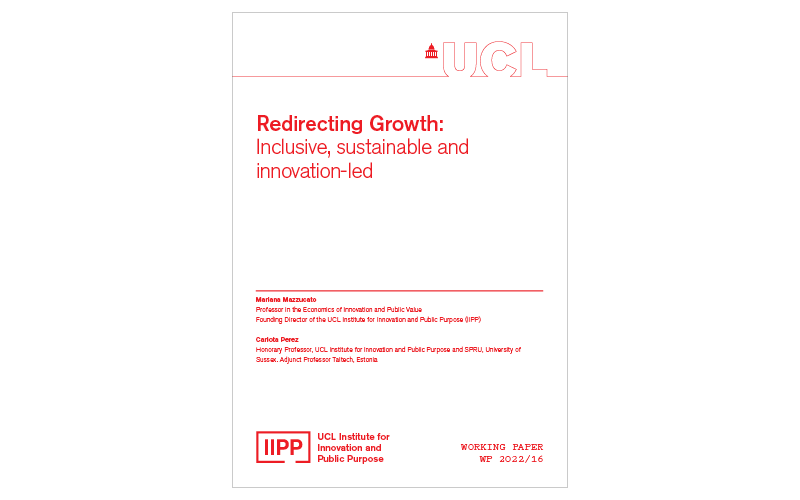Redirecting Growth: Inclusive, sustainable and innovation-led
The advanced world is facing a crucial moment of transition. This paper outlines suggestions for policies that aim to construct a prosperous, smart, green and fairer global economy.

21 October 2022
UCL Institute for Innovation and Public Purpose (IIPP) Working Paper Series: IIPP WP 2022/16
Authors:
- Mariana Mazzucato | Director and Professor in the Economics of Innovation and Public Value, UCL Institute or Innovation and Public Purpose
- Carlota Perez | Honorary Professor, UCL Institute for Innovation and Public Purpose and SPRU, University of Sussex. Adjunct Professor Taltech, Estonia
Reference:
Mazzucato, M. and Perez, C. (2022). Redirecting Growth: inclusive, sustainable and innovation-led. UCL Institute for Innovation and Public Purpose, Working Paper Series (IIPP WP 2022-16). https://www.ucl.ac.uk/bartlett/public-purpose/wp2022-16.
This working paper was initially published as part of the SPRU Working Paper Series (available here) and updated for the forthcoming chapter in A Modern Guide to Uneven Economic Development edited by Erik S. Reinert and Ingrid Harvold Kvangraven.
Abstract:
The advanced world is facing a crucial moment of transition. We argue that a successful outcome requires bringing innovation to the centre of government thinking and action and that, in order to do this, we must apply our knowledge of how innovation occurs and how to repair what has gone wrong. We look first at the role that innovation has always played as the driver of economic growth, and at its relationship with finance. Arguing that the challenge today is not to ‘fix’ finance while leaving the economy sick, but rather to change the way that the real economy works, we then identify the solution: a policy direction that is smart, inclusive and takes advantage of ‘green’ as the next big technological and market opportunity. We then explain why the role of the State is key to ensuring that such opportunities are taken, and the importance of direct public investment for promoting the creation of public value and courageous risk-taking in research and innovation in both the public and private sectors. We then examine the potential of such innovation-oriented policies to promote inclusive growth. We consider concrete steps that could be taken, at various government levels, to create the ‘smart governance’ necessary to implement such a direction. The paper closes with suggestions for policies that aim to construct a prosperous, smart, green and fairer global economy.
 Close
Close

